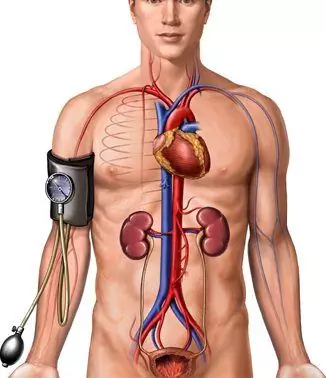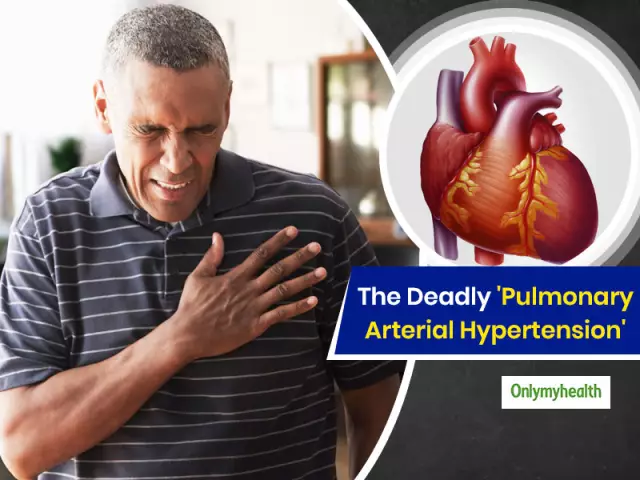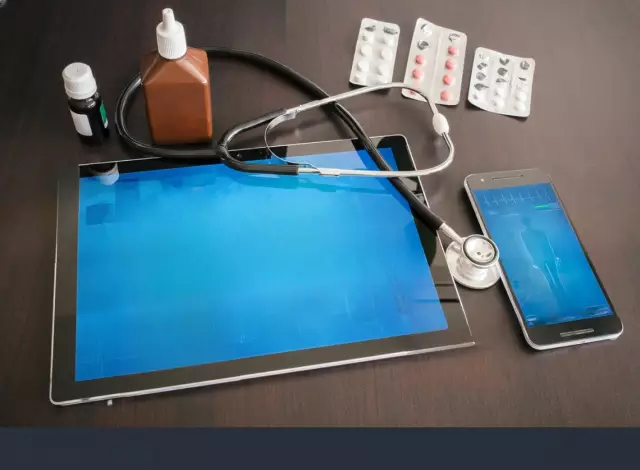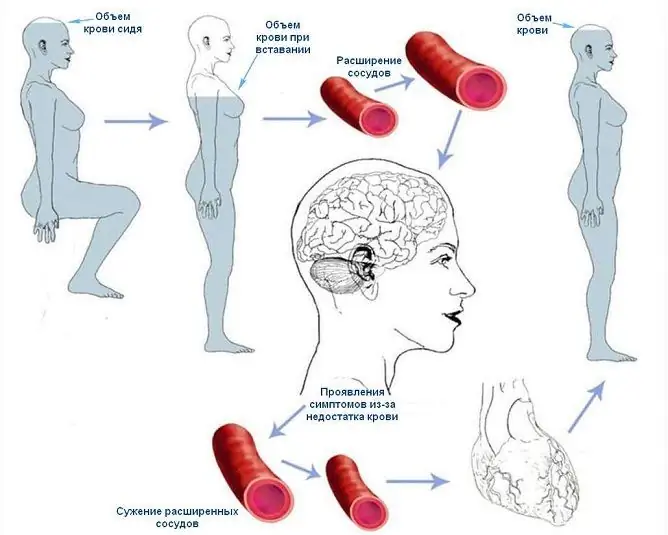- Author Rachel Wainwright wainwright@abchealthonline.com.
- Public 2023-12-15 07:39.
- Last modified 2025-11-02 20:14.
Arterial hypotension
Brief description of the disease

Arterial hypotension is a prolonged condition in which the systolic (upper) pressure falls below 100 mm Hg. column, and diastolic (lower) - below 60 mm Hg. pillar. In the cardiological literature, there are other figures, since there is no single point of view as to at what lowering of blood pressure a person begins to develop arterial hypotension. Doctors only agree that in this disease, the lower blood pressure is defined as 60 mm. rt. pillar and below.
Nowadays, experts distinguish two forms of the disease - primary and secondary. The essential (primary) form manifests itself either as a chronic disease or as a hereditary predisposition. In the case of the secondary form, a person's blood pressure decreases under the influence of defects and pathologies of the cardiovascular system. I would like to note that, unlike hypertension, arterial hypotension does not cause serious complications and consequences, but this does not mean that it is harmless. The danger of the disease manifests itself in a significant decrease in the quality of life of people suffering from increased fatigue, dizziness, lethargy and headaches. If you have been diagnosed with arterial hypotension, treatment will be based either on getting rid of the unpleasant symptoms of the disease, or on eliminating the diseasewhich led to a decrease in blood pressure. Ailments that affect a person's blood pressure include peptic ulcer disease, cirrhosis of the liver, anemia, hepatitis, and hypertension.
At the beginning of the 20th century, mainly elderly people suffered from arterial hypotension, but the development of technological progress and the transition from physical labor to mental activity led to the fact that low blood pressure is increasingly found among young people aged 19 to 30 years. In the absence of adequate treatment, arterial hypotension leads to a loss of vascular tone and heart muscles. This is a long process, but in any case it is unpleasant, therefore, at the first suspicion of arterial hypotension, you should consult with a cardiologist.
Arterial hypotension - symptoms and clinical picture
The main symptom of the disease is a decrease in blood pressure immediately after the transition of the body from a horizontal position to a vertical one. This process is accompanied by a deterioration in the blood supply to the brain and, as a result, dizziness, tinnitus, and darkening of the eyes. The discomfort does not last long - no more than 2-3 minutes. In some cases, too low blood pressure leads to fainting, ischemic stroke, and injury (if the patient falls due to short-term loss of consciousness). We also note that a person's pressure can decrease not only due to a sharp change in body position, but also as a result of past illnesses, the use of any potent drugs or after operations.
It is a different matter if the patient develops chronic arterial hypotension, the symptoms of which can appear anywhere and anytime. The chronic form of the disease is characterized by the following symptoms:
- weakness;
- fast fatiguability;
- nervousness;
- low efficiency;
- feeling tired immediately after a night's rest;
- headache;
- discomfort in the region of the heart;
- tendency to faint;
- poor tolerance of stuffiness, cold, heat or humidity.
Arterial hypotension - treatment of the disease

Regardless of the form of the disease, treatment should be comprehensive. It includes normalization of lifestyle, good sleep, rational alternation of work and rest, rejection of bad habits and proper nutrition. In addition, the patient should play sports, regularly walk in the fresh air and, if possible, take a tonic contrast shower. Physical therapy is also very important, since exercises bring blood pressure back to normal, allow you to get rid of its sharp drops. From medications used anticholinergics, antioxidants, nootropic drugs, tranquilizers and cerebroprotectors. If possible, they should be replaced with natural tonic preparations: ginseng, tinctures of aralia, lemongrass and eleutherococcus.
With secondary arterial hypotension, treatment of the underlying disease is necessary, since short-term elimination of symptoms cannot relieve a person of the main cause of discomfort.
Finally, we give a number of recommendations that will help you with arterial hypotension:
- keep alcohol consumption to a minimum;
- avoid prolonged exposure to high and low temperatures on the skin (they cause vascular dilatation and a decrease in blood pressure);
- stop taking medications that can lower a person's blood pressure;
- try to rest at least 8 hours a day;
- eat at least 4 times a day, but reduce the amount of food consumed at each meal;
- if there are no contraindications, increase the amount of table salt intake;
- during sleep, the head should be about 20-30 cm above the level of the legs;
- in the winter season, make up for the lack of vitamins and minerals with the help of special vitamin complexes;
- if low blood pressure is accompanied by emotional lability, unpleasant sensations in the heart and a decrease in mental performance, sign up for a course of therapeutic massage of the cervical-collar zone;
- consultation of a psychologist is required and it is very desirable to attend psychological trainings and courses of emotional relief. They increase your resistance to the influence of aggressive environmental factors and contribute to the formation of a stable psyche.
YouTube video related to the article:
The information is generalized and provided for informational purposes only. At the first sign of illness, see your doctor. Self-medication is hazardous to health!






